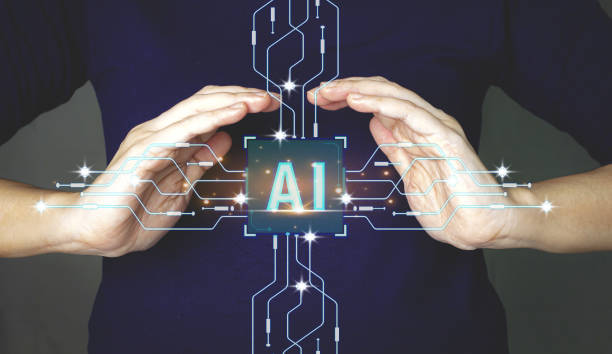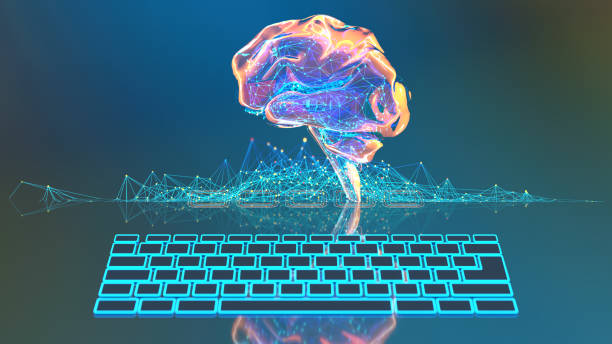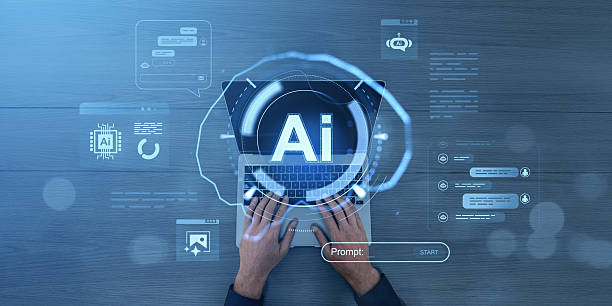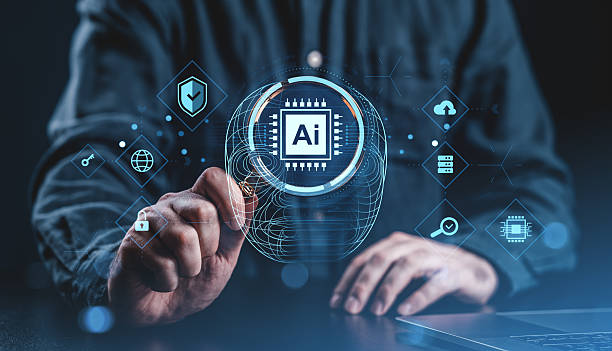What is Artificial Intelligence? Definition, History, and Key Concepts

#Artificial_Intelligence (AI) is a branch of computer science that deals with building intelligent machines capable of performing tasks that typically require human intelligence.
These tasks include learning, reasoning, problem-solving, natural language understanding, and pattern recognition.
Artificial intelligence is essentially an attempt to simulate human cognitive processes in machines. To better understand artificial intelligence, its history can be examined.
The idea of intelligent machines dates back to ancient times, but the official beginning of artificial intelligence as a scientific discipline dates back to the 1950s, when scientists such as Alan Turing and John McCarthy began working on this concept.
Over the following decades, artificial intelligence experienced many ups and downs, including periods known as “AI winters,” where research in this field decreased due to lack of funding and limited progress.
Key concepts in artificial intelligence include machine learning, deep learning, neural networks, natural language processing (NLP), and computer vision.
Machine learning allows machines to learn from data without explicit programming.
Deep learning is a subset of machine learning that uses deep neural networks to analyze data.
Neural networks are computational models inspired by the structure of the human brain.
NLP allows machines to understand and generate human language.
Computer vision allows machines to understand and analyze images. Artificial intelligence is rapidly advancing and has many applications in various fields.
Is your current online store website design not generating the expected sales?
Rasaweb is a specialist in professional online store website design!
✅ An attractive and user-friendly site with the aim of increasing sales
✅ High speed and security for an ideal shopping experience⚡ Get a free consultation on online store design with Rasaweb!
Types of Artificial Intelligence: From Narrow AI to General AI

Artificial intelligence can be categorized into different types based on its abilities and applications.
One of the most common classifications is the division into Narrow AI, General AI, and Super AI.
Narrow AI, also known as weak AI, is designed to perform specific tasks and performs very well in that area.
Examples of this type of artificial intelligence include movie recommendation systems on Netflix, voice assistants like Siri and Alexa, and facial recognition software.
These systems are capable of performing their tasks intelligently, but cannot operate outside their defined domain.
General AI, also known as strong AI, has cognitive abilities similar to humans.
This type of artificial intelligence can learn, understand, and perform various tasks, just like a human.
General AI has not yet been fully realized and is one of the main goals of artificial intelligence research.
It is believed that achieving General AI would bring about enormous changes in human life.
Super AI is beyond human intelligence and can surpass humans in all fields.
This type of artificial intelligence is mostly seen in science fiction stories and does not yet exist in reality.
However, some researchers believe that Super AI could become a reality in the future and have profound implications for human society.
The main difference between these three types of artificial intelligence is in the level of abilities and the range of their applications.
Narrow AI is for specific tasks, General AI has cognitive abilities similar to humans, and Super AI is beyond human abilities.
Applications of Artificial Intelligence in Various Industries: From Medicine to Automotive

Artificial intelligence is currently used in various industries and has created significant transformations in these fields.
From medicine to automotive, the applications of artificial intelligence are very wide and diverse.
In the field of medicine, artificial intelligence is used to diagnose diseases, develop drugs, and provide personalized healthcare.
AI-based systems can analyze medical images and diagnose diseases such as cancer in the early stages.
Also, artificial intelligence plays an important role in developing new drugs and improving the effectiveness of treatments.
In the automotive industry, artificial intelligence is used to develop self-driving cars, improve car safety, and optimize production processes.
Self-driving cars use artificial intelligence to understand their surroundings and make decisions about how to drive.
AI-based safety systems can detect potential hazards and prevent accidents.
In the financial sector, artificial intelligence is used to detect fraud, manage risk, and provide personalized financial services.
AI-based systems can identify suspicious patterns in financial transactions and prevent fraud.
Also, artificial intelligence plays an important role in providing personalized financial advice and improving customer experience.
In addition, artificial intelligence has many applications in other fields such as education, agriculture, and manufacturing.
In education, artificial intelligence can help teachers provide personalized education and improve student learning.
In agriculture, artificial intelligence can help farmers optimize water and fertilizer consumption and increase crop productivity.
In manufacturing, artificial intelligence can help factories improve production processes, reduce costs, and increase product quality.
Machine Learning and Deep Learning: Two Fundamental Approaches in Artificial Intelligence

Machine learning and deep learning are two fundamental approaches in artificial intelligence that allow machines to learn from data and make decisions.
Machine Learning is a branch of artificial intelligence that allows machines to learn from data without explicit programming.
In machine learning, machines use various algorithms to identify patterns and relationships in data and make predictions and decisions based on them.
For example, a machine learning system can analyze customer purchase data, identify their purchase patterns, and recommend products to them based on those patterns.
Deep Learning is a subset of machine learning that uses deep neural networks to analyze data.
Deep neural networks are computational models that are inspired by the structure of the human brain and consist of multiple layers of interconnected nodes.
These networks can identify complex and non-linear patterns in data and perform better than traditional machine learning algorithms.
For example, a deep learning system can analyze images, identify objects in them, and categorize them.
The main difference between machine learning and deep learning is in the structure and complexity of the models used.
Machine learning uses simpler algorithms, while deep learning uses deep and complex neural networks.
For this reason, deep learning is usually more suitable for more complex problems and larger datasets.
Both machine learning and deep learning approaches play an important role in the development of artificial intelligence and have many applications in various fields.
The choice between these two approaches depends on the type of problem and the available data.
Is your current online store website design not generating the expected sales?
Rasaweb is a specialist in professional online store website design!
✅ An attractive and user-friendly site with the aim of increasing sales
✅ High speed and security for an ideal shopping experience⚡ Get a free consultation on online store design with Rasaweb!
Challenges and Limitations of Artificial Intelligence: From Ethics to Bias

Artificial intelligence, despite its many potentials, also faces numerous challenges and limitations.
These challenges include ethical issues, bias in data, and security issues.
One of the most important challenges of artificial intelligence is ethical issues.
With the expansion of artificial intelligence applications in various fields, questions are raised about accountability, transparency, and privacy.
For example, if a self-driving car causes an accident, who will be responsible? How can we ensure that artificial intelligence systems make fair decisions? How can we protect people’s privacy from artificial intelligence systems?
Another challenge of artificial intelligence is bias in data.
Artificial intelligence systems learn based on the data they are given.
If the data used to train an artificial intelligence system is biased, the system will also be biased and make unfair decisions.
For example, if a facial recognition system is trained using data that mostly includes images of white people, it may perform poorly in recognizing the faces of black people.
Security issues are also among the important challenges of artificial intelligence.
Artificial intelligence systems can be targeted by cyberattacks and misused.
For example, a facial recognition system can be used to identify and track people without their knowledge.
In general, addressing the challenges and limitations of artificial intelligence requires joint efforts from researchers, policymakers, and society.
The Future of Artificial Intelligence: Prospects and Possibilities Ahead

The future of artificial intelligence is very bright and full of possibilities.
With the ever-increasing advancement of technology, artificial intelligence is expected to play a more important role in human life and create enormous transformations in various industries.
One of the most important prospects of artificial intelligence is the development of General AI.
Achieving General AI means that machines will be able to perform various tasks, just like a human.
This can lead to the automation of many jobs and increased productivity in various industries.
Another prospect is the expansion of artificial intelligence applications in new areas.
Artificial intelligence is expected to play a more important role in areas such as education, health, and energy, and help solve complex problems.
For example, artificial intelligence can help develop new methods of treating diseases, optimizing energy consumption, and providing personalized education.
However, the development of artificial intelligence requires attention to ethical and social issues.
It must be ensured that artificial intelligence is used for the benefit of society and that its misuse is prevented.
Also, the impact of artificial intelligence on the labor market and employment should be considered, and programs should be provided to train and empower the workforce.
In general, the future of artificial intelligence is very promising, but it requires proper planning and management to be able to fully benefit from its potential.
Natural Language Processing (NLP): Key to Human-Machine Interaction

Natural Language Processing (NLP) is one of the important branches of artificial intelligence that allows machines to understand and generate human language.
NLP plays a key role in human-machine interaction and has many applications in various fields.
NLP includes a set of techniques and algorithms that allow machines to analyze human texts and speech and extract their meaning.
For example, an NLP system can read a text and identify its main topic, or receive a question and answer it.
NLP also allows machines to generate new texts, such as translating a text from one language to another, or writing a summary of an article.
The applications of NLP are very wide and diverse.
These applications include the following: Voice assistants such as Siri and Alexa use NLP to understand users’ voice commands and answer their questions.
Machine translation systems such as Google Translate use NLP to translate texts from one language to another.
Chatbots use NLP to interact with users and answer their questions.
Sentiment Analysis systems use NLP to analyze users’ opinions and feelings about products and services.
With the ever-increasing advancement of technology, NLP is expected to play a more important role in human life and help improve human-machine interaction.
For example, NLP can help develop personalized educational systems, improve customer service, and provide more accurate and faster information.
Natural language processing as a key to human-machine interaction, plays a very important role in the advancement of artificial intelligence.
Computer Vision: The Ability of Machines to See and Understand Images

Computer Vision is one of the important branches of artificial intelligence that allows machines to see, understand, and analyze images.
Computer vision plays an important role in automating many tasks and improving the performance of various systems.
Computer vision includes a set of techniques and algorithms that allow machines to process images and extract useful information from them.
For example, a computer vision system can identify objects in an image, recognize people’s faces, and track their movements.
The applications of computer vision are very wide and diverse.
These applications include the following: Self-driving cars use computer vision to understand their surroundings and make decisions about how to drive.
Facial recognition systems use computer vision to identify people and control access to buildings and devices.
Quality inspection systems in factories use computer vision to inspect products and identify defects.
Medical imaging systems use computer vision to analyze medical images and diagnose diseases.
Are you worried about the low conversion rate of your online store and don’t have the sales you want?
Rasaweb is your specialized solution for having a successful online store.
✅ Significant increase in conversion rate and sales
✅ Professional and user-friendly design to attract customer satisfaction
⚡ Ready to transform your online sales? Get a free consultation!
Robotics and Artificial Intelligence: Synergy to Create Smarter Machines

Robotics and artificial intelligence are two related fields that, when combined, enable the creation of smarter and more capable machines.
Robotics deals with the design, construction, and operation of robots, while artificial intelligence deals with the development of systems that are capable of performing tasks that typically require human intelligence.
By combining robotics and artificial intelligence, robots can be built that are capable of understanding their surroundings, learning from experiences, and making intelligent decisions.
These robots can be used in various industries such as manufacturing, services, and healthcare and help improve productivity and quality of service.
For example, intelligent robots can automatically perform various tasks in factories, such as assembling parts, packaging products, and transporting materials.
These robots can use sensors and cameras to understand their surroundings and use artificial intelligence algorithms to make the best decisions for performing their tasks.
Also, intelligent robots can help provide services to patients in hospitals, such as distributing medications, helping to move patients, and performing precise surgeries.
The combination of #robotics and artificial intelligence creates new prospects for the development of smarter and more capable machines.
These machines can help humans in various fields and help improve their lives.
Ethical Considerations in the Development and Use of Artificial Intelligence
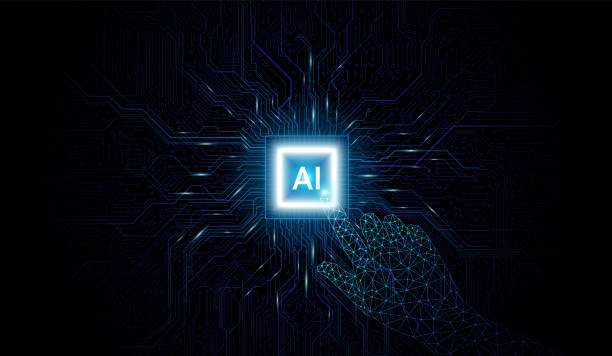
The development and use of artificial intelligence raises important ethical considerations that must be addressed.
With the expansion of artificial intelligence applications in various fields, questions are raised about accountability, transparency, and privacy that require careful examination.
One of the most important ethical considerations is the issue of accountability.
If an artificial intelligence system causes damage, who will be responsible? Is the system manufacturer, the system user, or the system itself responsible? These questions require precise and clear answers to prevent damage and properly determine responsibility.
The issue of transparency is also among the important ethical considerations.
How can we ensure that artificial intelligence systems make fair decisions? How can we review the performance of artificial intelligence systems and prevent bias in them? To answer these questions, artificial intelligence systems must be designed in such a way that their performance is understandable and reviewable.
The issue of privacy is also among the important ethical considerations.
Artificial intelligence systems usually need to collect and analyze people’s personal data.
How can we protect people’s privacy from artificial intelligence systems? To answer this question, laws and regulations must be put in place that limit the collection and use of personal data and prevent its misuse.
In general, the development and use of artificial intelligence should be done in compliance with ethical considerations to be able to fully benefit from its potential and prevent problems.
This requires joint efforts from researchers, policymakers, and society.
Frequently Asked Questions
| Question | Answer |
|---|---|
| What is the definition of Hoosh Masnooi (Artificial Intelligence)? | It is a field in computer science that aims to create intelligent machines that can think, learn, solve problems, and make decisions like humans. |
| Mention some common AI applications. | Includes self-driving cars, voice assistants (such as Siri and Alexa), recommendation systems (such as Netflix and Amazon), facial recognition, and medical diagnostics. |
| What is the difference between Narrow AI (ANI) and General AI (AGI)? | Narrow AI is specialized in a single, specific task, while General AI possesses human intellectual ability to perform any cognitive task. |
| What is Machine Learning and its relationship to AI? | Machine learning is a branch of artificial intelligence that focuses on developing algorithms that allow systems to learn from data without explicit programming. |
| What are Artificial Neural Networks? | They are computational models inspired by the structure and function of the human brain, and are used in deep learning to process data and discover complex patterns. |
| Mention some ethical challenges related to AI. | Includes issues of privacy, bias in data and algorithms, job loss, and accountability in case of errors or unfair decisions. |
| What is Natural Language Processing (NLP)? | It is a branch of artificial intelligence that focuses on enabling computers to understand, interpret, and generate human language in a useful and interactive way. |
| How can AI affect the job market? | It can lead to the automation of some routine tasks, requiring retraining of workers and creating new jobs in the areas of design, development, and maintenance of AI systems. |
| What is Computer Vision? | It is a field in artificial intelligence that enables computers to “see,” understand, and interpret images and videos in the same way that humans do, enabling them to recognize objects and faces. |
| What is the importance of data in the development of AI systems? | Data is the fuel that feeds AI systems, especially in machine learning. The quality and quantity of data significantly affect the accuracy and performance of models and their ability to learn and make correct decisions. |
And other services of Rasa Web Advertising Agency in the field of advertising
Smart Direct Marketing: An innovative platform for improving customer attraction by customizing the user experience.
Intelligent Digital Advertising: Professional optimization to improve SEO ranking using custom programming.
Intelligent Custom Software: Transform digital branding with the help of custom programming.
Intelligent Content Strategy: Designed for businesses looking to manage campaigns through the use of real data.
Intelligent Data Analysis: An effective tool for attracting customers through marketing automation.
And more than hundreds of other services in the field of internet advertising, advertising consulting, and organizational solutions
Internet Advertising | Advertising Strategy | Reportage Ad
Resources
What is artificial intelligence? Prominent methods about it
,What is artificial intelligence and what are its applications?
,What is the future of artificial intelligence?
,Artificial Intelligence Training with Python – Introductory
? Are you ready to transform your business in the digital world? Rasaweb Digital Marketing Agency, with expertise in WordPress website design and comprehensive online marketing strategies, paves the way for your success.
📍 Tehran, Mirdamad Street, next to the Central Bank, South Kazerun Alley, Ramin Alley, No. 6

